 Petzlover
Petzlover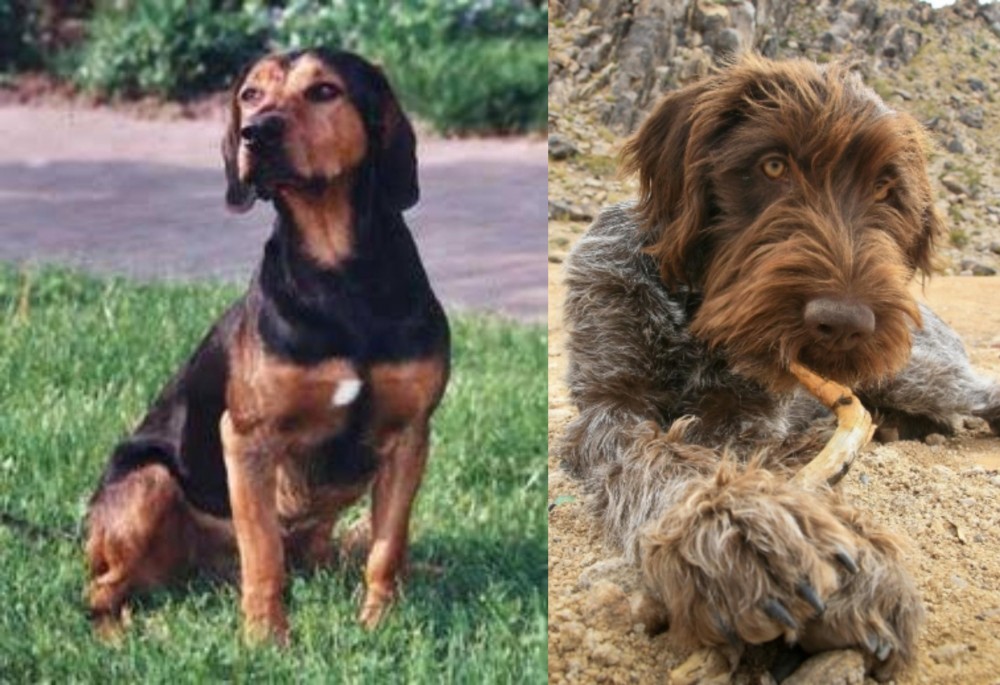 Tyrolean Hound is originated from Austria but Wirehaired Pointing Griffon is originated from France. Tyrolean Hound may grow 10 cm / 3 inches shorter than Wirehaired Pointing Griffon. Both Tyrolean Hound and Wirehaired Pointing Griffon are of same weight. Both Tyrolean Hound and Wirehaired Pointing Griffon has almost same life span. Both Tyrolean Hound and Wirehaired Pointing Griffon has almost same litter size. Tyrolean Hound requires Low Maintenance. But Wirehaired Pointing Griffon requires Moderate Maintenance
Tyrolean Hound is originated from Austria but Wirehaired Pointing Griffon is originated from France. Tyrolean Hound may grow 10 cm / 3 inches shorter than Wirehaired Pointing Griffon. Both Tyrolean Hound and Wirehaired Pointing Griffon are of same weight. Both Tyrolean Hound and Wirehaired Pointing Griffon has almost same life span. Both Tyrolean Hound and Wirehaired Pointing Griffon has almost same litter size. Tyrolean Hound requires Low Maintenance. But Wirehaired Pointing Griffon requires Moderate Maintenance
 The Tyrolean Hound, also known as Tyroker Bracke or Tiroler Bracke originates from Tyrol, Austria. It seems the dog was developed in the late 1800s for hunting.
The Tyrolean Hound, also known as Tyroker Bracke or Tiroler Bracke originates from Tyrol, Austria. It seems the dog was developed in the late 1800s for hunting.
This is a scenthound that is thought to have descended from Celtic Hounds, Foxhounds and Bloodhounds in the late 1800s.
The dog is a member of the FCI’s scent hound group. The dog was recognized as its own breed in 1908, and in 2006 it was recognized by the United Kennel Club.
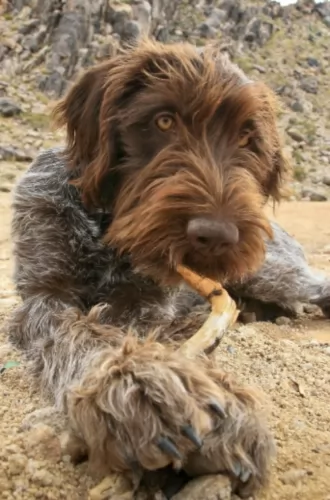 Known also as the Korthals Griffon, the Wirehaired Pointing Griffon is a hunting- and gundog. It was Eduard Karel Korthals who is thought to have brought about this dog breed around 1873.
Known also as the Korthals Griffon, the Wirehaired Pointing Griffon is a hunting- and gundog. It was Eduard Karel Korthals who is thought to have brought about this dog breed around 1873.
He was a Dutchman living in France. It is believed that quite a few dog breeds were used to bring about this dog such as the Otterhound, Spniels, Setters and possibly a Pointer. The dog is known as a supreme gundog and it is a very popular dog breed.
Edward Korthals of Holland was looking for an ideal gun dog. It was in 1888 that the first Griffon Club was formed. It was only in 1916 that this dog was officially recognized as the Wirehaired Pointing Griffon in the United States.
 The Tyrolean Hound is a medium-sized to large dog. He stands at roughly between 43 to 50cm in height and can weigh between 20 and 27kg.
The Tyrolean Hound is a medium-sized to large dog. He stands at roughly between 43 to 50cm in height and can weigh between 20 and 27kg.
He is muscular, lean and compact. The double coat is short and smooth and can be red, tan, black or tri-colored. The ears are high set, are broad, floppy and long. The tail is long and is carried high.
Independent and intelligent the Tyrolean Hound is a hardworking dog, loving to be active. He has all the characteristics of a great pet and companion – loving, lively, intelligent, independent, easily trained and protective.
He’s the kind of dog that would suit a home with a large garden as opposed to living in the city. He is wary of strangers and has a loud bark to warn you of intruders. He has a friendly nature with his human family and makes a good playmate for children.
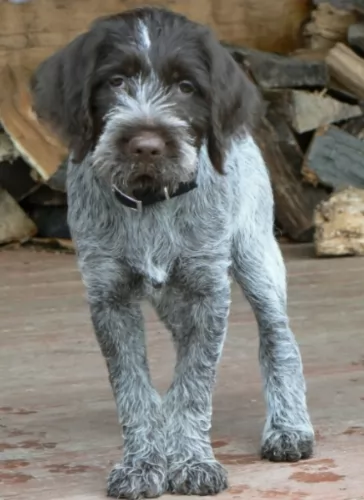 The Wirehaired Pointing Griffon or Korthals Griffon is a medium-to-large sized dog standing at between 50 and 60cm both male and female and weighing between 23and 27kg.
The Wirehaired Pointing Griffon or Korthals Griffon is a medium-to-large sized dog standing at between 50 and 60cm both male and female and weighing between 23and 27kg.
He has a wiry, somewhat harsh curly outer coat and a softer undercoat. The head is quite large. He has thick eyebrows and a beard. The eyes are brown with yellow irises.
This is a low-shedding dog. There are a few colors such as white and brown, white and orange but the coat is also steel gray with brown markings.
These dogs are intelligent and independent with a desire to please their owners. He is able to learn tricks and commands easily. They love their human families and want to be around them all the time.
It would be devastating for such a dog to find himself stuck in the backyard with no human contact. He is also not suited to cramped living conditions in the city but is essentially a country dog, especially since he has boundless energy.
As a family pet, he is playful, friendly, loyal, loving and gentle, behaving well with children and other pets. They’re not aggressive dogs but they make excellent watchdogs, barking if someone comes into their property.
 The Tyrolean Hound is a keen hunting dog loving to be outdoors and active, requiring large grounds to be happy.
The Tyrolean Hound is a keen hunting dog loving to be outdoors and active, requiring large grounds to be happy.
Once he comes indoors he is able to settle down with his human family and have some quiet time with them.
He is loyal and loving, but you are going to have to be prepared for an active lifestyle with this skilled hunting dog of yours.
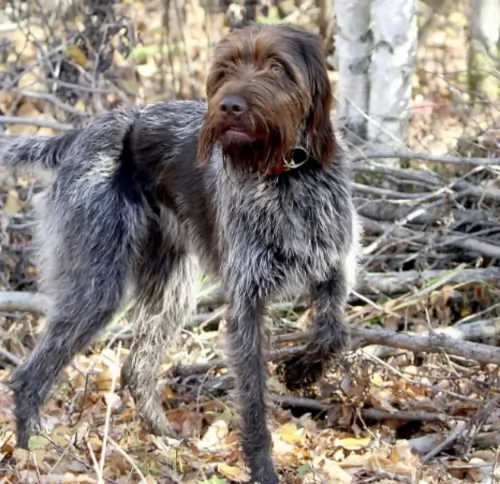 The Wirehaired Pointing Griffon has always been a great hunting dog and he doubles as an excellent pet and companion as well.
The Wirehaired Pointing Griffon has always been a great hunting dog and he doubles as an excellent pet and companion as well.
This dog is extremely loyal to his human family and is friendly, intelligent, loving and affectionate, getting on well with children as well as other pets in the home.
He can reach 14 years of age and doesn’t often get sick, making him an all-round great pet and companion.
 Because these dogs put everything into their hunting, injuries related to hunting can sometimes plague this energetic dog.
Because these dogs put everything into their hunting, injuries related to hunting can sometimes plague this energetic dog.
Apart from that, he is robust and can live to be 12 – 14 years of age. There are one or two common dog illnesses to look out for with this dog such as hip dysplasia or ear infections.
The large, floppy ears of the Tyrolean Hound are prone to ear infections. Unlike with dogs that have erect ears, these dogs don’t have their inner ears aired and the dampness, wax and dirt cause bacteria to build up which ultimately leads to an ear infection.
The hip joint forms abnormally, leading to chronic wear and tear together with inflammation. Sometimes the dog will squeal when he gets touched around his hips. The condition can worsen and sometimes the dog even becomes lame. He will need to get to the vet for something to control pain.
 He has a short coat and will simply require a brush twice a week. Because of the fairly large, floppy ears, he will need to have the inside of his ears checked for redness and the possibility of an ear infection.
He has a short coat and will simply require a brush twice a week. Because of the fairly large, floppy ears, he will need to have the inside of his ears checked for redness and the possibility of an ear infection.
This dog has always been used to plenty of exercise. He won’t adapt to life in the city on a tiny property. The ideal place for this dog is on a large property, preferably a farm.
Walks, hikes, swimming, ball games, hide and seek – he is a dog that can’t seem to get enough action – he wants to be in on all the action. He is intelligent and will also need mental stimulation.
If you were to buy your lean Tyrolean Hound some commercially manufactured food, you’d buy him food that was made for high energy dogs. You’d certainly want to make sure the food is of a high quality, packed with vitamins and minerals and natural ingredients.
He would also love some home-made food too. Raw meat occasionally would do him the world of good. This sort of food needs to be plain and simple such as boiled chicken, brown rice and vegetables.
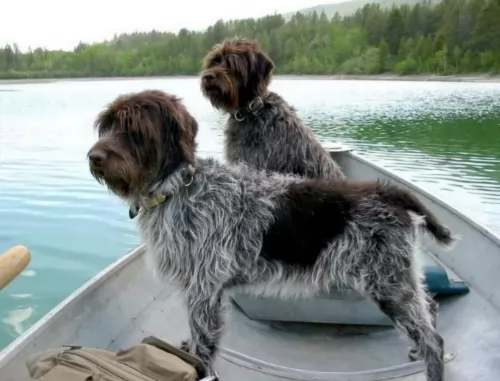 This dog loves his exercise, and if you live in the country so much the better. He will love to go hiking and swimming with you or running next to you as you go cycling. He also loves all kinds of rope- and ball games in the garden. It’s why this active dog isn’t ideal for life in the city.
This dog loves his exercise, and if you live in the country so much the better. He will love to go hiking and swimming with you or running next to you as you go cycling. He also loves all kinds of rope- and ball games in the garden. It’s why this active dog isn’t ideal for life in the city.
Spay or neuter your pet if you don’t want unwanted puppies. Don't do it too early. Speak to your vet about the procedure and about the health benefits that come from spaying and neutering a dog.
These are active dogs and they will require top quality food if they’re to remain healthy and active.
Always check the packaging to see what ingredients are present in your dog’s food. Some of the cheaper, more inferior brands can actually be harmful to your pet with their useless ingredients devoid of vitamins and minerals.
Some home-made food is good and this needs to be plain and free from spicy additives. Dogs have sensitive stomachs and anything unusual can cause them digestive problems.